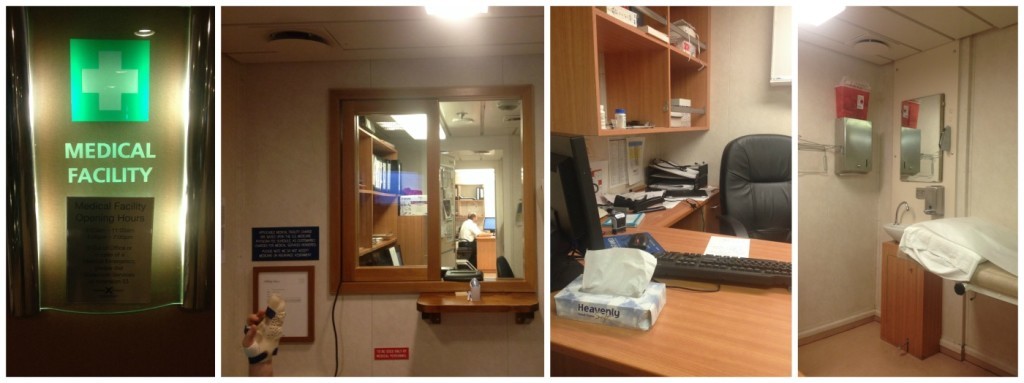Norovirus at Sea is Every Cruise Passenger’s & Cruise Line’s Worse Nightmare
Having just read an article reporting the first Norovirus outbreak at sea for 2015 in the US on the Grandeur of the Seas, I thought it a good idea to shed some light on the reasons behind the causes of such an outbreak, what has to be done, and how it affects us passengers.
The last thing anyone wants to have when going on holiday is falling ill to some unknown sickness and having to spend days on end in bed, or worse still a visit to a doctor in a foreign country. It’s no different on a ship except that the ship’s master and crew are probably more worried about it than anyone.
That is really no surprise as it’s not only a major hassle and huge amount of extra work when such an outbreak occurs, there are certain protocols that must be followed which have a roll on effect. More on theat later, lets take a look at what might cause a norovirus outbreak.
What causes a Norovirus outbreak?
- Poor sanitation in all areas of the ship.
- Food hygiene practices are slack.
- Personal hygiene among staff and passengers is poor.
- Passengers with pre contracted yet undetected symptoms.
- Passengers knowingly boarding feeling sick.
These are all possible reasons for a Norovirus outbreak, however, the last one on the list is the most alarming and probably the most common reason, which should concern you as a passenger.
When checking in for a cruise, each passenger is required to fill out a health form declaring that they are fit and well. The reason why some people who maybe sick actually LIE on these forms, is because they either don’t want to forfeit the cruise, they have no health insurance or are ignorant of the consequences.
What ever the reason, it’s a very disturbing, known fact.
We must not forget that these ships, which are getting bigger and bigger are literally floating cities Some ships have up to 6000 passengers plus more crew. People confined to the ship, consistently eat, drink, sneeze and touch lift buttons, hand rails, chair arms, casino machines, noses & faces 24/7. It’s somewhat inevitable that if just one person is sick that it can spread at a rapid pace throughout the ship. Prevention is the key.
This is the problem that the crew have to deal with voyage after voyage. Every ship has a dedicated team of cleaners and sanitisers that work on a 24 hour basis. Sometimes that is still not enough. The most important thing is that each and every passenger has an increased sense of cleanliness prior to boarding and during the cruise.
What precautions can passengers take to avoid contracting or spreading the Norovirus?
- Wash your hands and sanitise often
Passengers must wash their hands and forearms on every visit to the bathroom and even at any opportunity. This must be done with running HOT water, the hottest that you can use with soap. Use the paper towels to open the restroom doors.
Before entering any food venue use the hand sanitizer that is always available at the entrances to these places. Avoid touching your face and any surface if you can. Coughing and sneezing are to be observed with great self-awareness and remember to washy washy.
I see it every cruise, some passengers just have a total lack of hygiene and others an extreme concern, even using their own disinfectant wipes to sanitise the table they sit at.
- Avoid touching things
Avoid touching surfaces as much as possible. Shaking hands is a no go onboard, replaced with a fist tap if must be.
- Visit the medical center
The proper course of action is to visit the medical center for a check up from the ship’s doctor. This is why you should always have some insurance. Passengers without insurance put off a visit to the ship’s doctor because they know it could become an expensive holiday. And therefor the chances of them infecting others increases. Do the right thing and see the doctor as soon as you suspect any of the symptoms. You could be the difference between a full-blown norovirus outbreak or a quickly contained illness.
What is Norovirus and what are the symptoms of a Norovirus?
Almost everyone at some stage in their life will contract some form of gastroenteritis or just gastro for short. Norovirus is the most common viral gastro and effects some 267 MILLION people each year (Wikipedia). It is spread by people to people and a simple touch of a contaminated surface can be enough to contract the virus.
These are some of the most common symptoms;
- An unsettled feeling
- Nausea
- Abdominal pain/stomach cramps
- Muscle aches
- Headache
- Vomiting
- Diarrhea
- Fever
What effect does an outbreak have to the cruise ship?
This is almost self-explanatory, as it can be disastrous. As soon as a possible outbreak is acknowledged the crew have to take massive action and introduce strenuous cleaning and sanitation protocols. The whole flow of food service goes from self-serve to being served, this has a roll on effect for guests.
Many ship areas will be closed for sanitation procedures. The crew will be required to work extreme hours to help double up on cleaning and senior staff will be monitoring passengers for any signs of the illness.
All this is before the cruise line even considers the impact to the bottom line. If a cruise has to miss a port of call due to an outbreak, they often reimburse the passengers. Not only that, but bad press and negative public reports start to fill social networks and can have a massive effect on revenue of the cruise line.
Strict government guidelines for cruise lines from the public health service
It’s also worth noting that cruise ships that visit a US port have a regulatory authority from the public health service, that inspects and controls the sanitation of cruise ships that fall under their jurisdiction. This is called a Vessel Sanitation Program or VSP for short. I have not yet found out if there is a similar authority for Europe or Asia.
The incredible thing is: VSP only requires 2% of the passengers to report symptoms, for the authority to register it as an outbreak. On a ship with 2500 passengers that means only 50 people with symptoms would constitute an outbreak. The thing is the fifty people need to have been seen by the medical staff. So in reality the number could be far greater, yet not classified as an outbreak!!
On checking the VSP website I did some research, and each year you can see the lists of cruise line’s and ships that have been declared as having a Norovirus outbreaks. There are not that many when you consider how many cruise ships are in operation and cruising week in week out from the USA, let alone the entire world.
I hope to find some more of these authorities with such detailed information in other parts of the cruising world. Until then have a wonderful cruise and stay healthy… If you only remember one thing from this post let it be “wash your hands often”.
Have you experienced any unwelcome symptoms on a cruise before or maybe noticed the ship taking extra precautions to prevent a Norovirus outbreak? We’d love to hear about them in the comments below.





No comments yet.